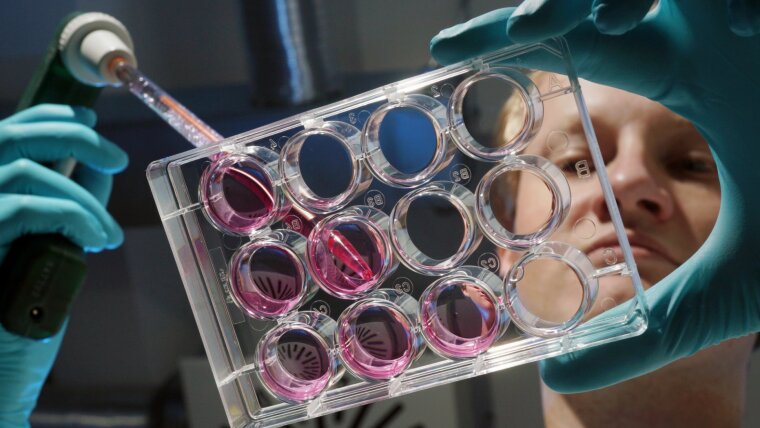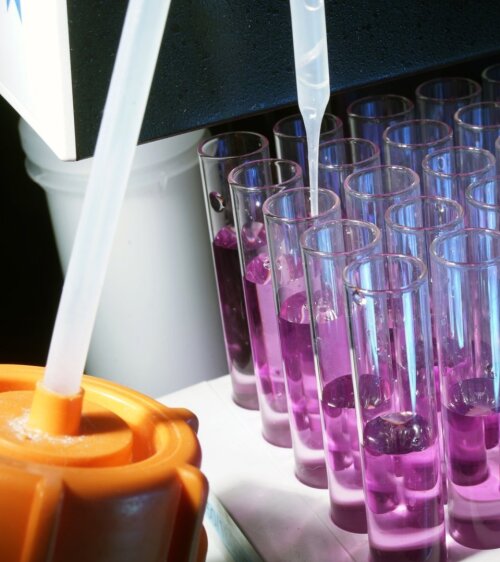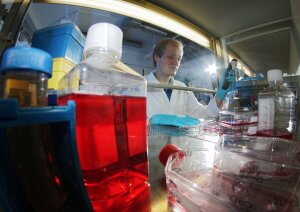
- Degree
- Bachelor of Science
- Admission restriction
- with Numerus Clausus (NC)
- Duration
- 6 Semesters
- Credits/ECTS
- 180
- Teaching language
- German
- Tuition fee
- None
- Semester contribution
- € 305,05
- Start of studies
- Winter semester
- Part-time possible
- Yes
- Institutions
- Faculty of Biological Sciences
- Institutes of the Faculty of Biological Sciences
Programme content
As the saying goes? It's the little things that make up life. This is exactly where the complex Bachelor's degree programme »Biochemistry / Molecular Biology« comes in: This degree) subject is all about the chemical processes in living things. Every matter and every substance consists of tiny particles such as atoms or molecules. These include, for example, the components of our genes, known as DNA. For things that are not visible to the naked eye, methods must be found to make them visible. An exciting and diverse field! What does it take? Above all, curiosity, patience and perseverance. For example, illnesses can be better understood and new drugs, biomaterials or diagnostic procedures can be developed. Because progress is linked to understanding molecular processes. This is why molecular biology and genetic engineering have increasingly emerged as new specialisms in the natural sciences in recent years.
Friedrich Schiller University Jena is one of the few German universities to offer the highly specialised degree course in biochemistry. The focus »Molecular Biology« places a strong biological accent on your education. Your basic discipline training in the first semesters is therefore broadly diversified: Content is taught on Biochemistry, Biophysics, Experimental Medicine, Genetics, Molecular Biology, Theoretical Biology and Cell Biology. You will also receive training in botany, microbiology, zoology, mathematics/biostatistics, Physics and, in particular, Chemistry. And not just in theory, but above all in practice! Laboratory practicals and experiments are an integral part of the programme to deepen the content of the lectures. This is sure to awaken your spirit of research!
Structure
The Bachelor's degree is the first professional qualification. The standard period of study|regular programme length is six semesters in total, during which various types of courses (e.g. seminars, lectures or tutorials) are offered for the individual modules.
In the single-subject Bachelor's degree programme »Biochemistry / Molecular Biology«, the course focuses on one degree subject with a total of 180 credit points (abbreviation: LP / 1 LP = 30 hours of attendance, preparation and follow-up work|follow-up activity, coursework and examinations).
The first study phase (1st to 4th semester) is standardised for all students. The second study phase (5th / 6th semester) includes a wide tender of elective modules. These allow you to specialise in a corresponding professional field or to focus on a Master's degree programme that builds on the Bachelor's degree.
How might your degree programme shape up?
| 1st semester | 2nd semester | 3rd semester | 4th semester | 5th semester | 6th semester |
| Inorganic and general Chemistry (12 CP) |
Physics (6 CP) |
Biochemical & Molecular Biological Methods (8 CP) |
Bachelor thesis (10 CP) |
||
| Physical Chemistry (9 CP) |
Organic Chemistry (13 CP) |
Microbiology (7 CP) |
Biophysics and Bioinformatics (9 CP) |
Proof|to register for|to take several required elective modules totalling 30 CP* |
|
| Genetics (9 CP) |
Biochemistry I (14 CP) |
Biochemistry II (13 CP) |
|||
| Mathematics (3 CP) |
Zoology (8 CP) |
Experimental Medicine (9 CP) |
|||
| Cell Biology (5 LP) |
Project module (5 CP) |
||||
| Botany (7 CP) |
|||||
Abbreviations: CP = credit points (ECTS)|ECTS credits
* In the elective area, there are modules with 5 LP and 10 LP. These must be selected so that you achieve a total of 30 CP. The following modules are tendered, for example: Natural Product Chemistry, Virology, Biomembranes, Human Genetics or Medicine Microbiology.
You can find more detailed information in the module catalogue for the degree programmeExternal link.
Why study in Jena?
- Excellent research: At the Faculty of Biological Sciences de, research de is focussed on three main areas to which Jena makes particularly important contributions. These focuses are microbial communication, biodiversity and evolution and the regulation of age-associated processes.
- High practical component: You will come into contact with current research work at an early stage and acquire special qualifications in the fields of Biochemistry, Molecular Biology and Molecular Medicine.
- closely networked: Cooperation between the non-university institutes is ensured, among other things, by the fact that the directors and also many heads of research groups|working groups|study group|study group|task force at the Leibniz Institute for Natural Product Research and Infection Biology(Hans Knöll InstituteExternal link) and for Ageing Research(Fritz Lipmann InstituteExternal link) are also teaching staff at the university.
- unlimited opportunities: Experience internationality! The university attracts students and academics from all over the world with its attractive conditions and characterises Jena as a future-oriented and cosmopolitan city - ideal requirements for prospective international studentsmp4, 57 mb · de.
- Adventures abroad: You can easily fulfil your dream of a semester abroad during your studies. Our university has a worldwide network of partner universities.
What can you do after your studies?
Career opportunities:
PhD student works in a laboratory at the Center for Molecular Biomedicine
Image: Jan-Peter Kasper (University of Jena)- Research (usually with a doctorate)
- Biotechnological, chemical and pharmaceutical industry
- Economic sectors directly related to the life sciences
- border area between Biology and Medicine
- science-orientated subjects) areas|fields of the public sector
What are we looking for in prospective students?
- Interest in scientific questions and laboratory work
- Ability for self-organised learning
- Good knowledge of Biology, Chemistry, Physics and Mathematics
- Basic computer skills
- Skill in experimentation
- good knowledge of the English language
Admission requirements
-
University entrance qualification
A university entrance qualification, such as a general secondary school leaving certificate, is required for admission onto the study programme.
More information on university entrance qualifications can be found here.
-
Language requirements
Good knowledge of the English language desired
Contacts
Bachstraße 18 k (1.OG)
07743 Jena
Google Maps site planExternal link
Hans-Knöll-Straße 2
07745 Jena
Google Maps site planExternal link
Bachstraße 18 k (1.OG)
07743 Jena
Google Maps site planExternal link
Neugasse 24
07743 Jena
Google Maps site planExternal link
University Main Building / SSZ
Fürstengraben 1
07743 Jena
Google Maps site planExternal link
Office hours:
We offer consultations in person, by telephone, and via Zoom. You can make an appointment by calling us on +49 3641 9-411111 (Mondays to Fridays from 9:00 to 11:00) or outside these office hours on +49 3641 9-411200. You can also use our remote help desk.
Consultation hours:
Mondays, Tuesdays, Thursdays and Fridays (9:00 to 12:20), Tuesdays (14:00 to 18:00), and Wednesdays and Thursdays (14:00 to 16:00).
Video chat: To the video chat – Zoom Videochat ZeitenMondays to Fridays (12:30 to 13:00) Password ZSB2020 Data protection informationpdf, 101 kb
University Main Building, Room E065
Fürstengraben 1
07743 Jena
Google Maps site planExternal link
Opening hours:
Information Desk (UHG; Room E0.65)
Mondays (10:00 – 12:00)
Tuesdays (13:00 – 15:00)
Wednesdays (10:00 – 12:00)
Thursdays (13:00 – 15:00)
Fridays (10:00 – 12:00)
You can also use our remote help desk at
www.uni-jena.de/service-ssz
or send us your enquiries by post.
Telephone hours:
Mondays to Fridays
(9:00 – 11:00)
Postal address:
Friedrich-Schiller-Universität Jena
Studierenden-Service-Zentrum
07737 Jena
University Main Building
Fürstengraben 1
07743 Jena
Google Maps site planExternal link

